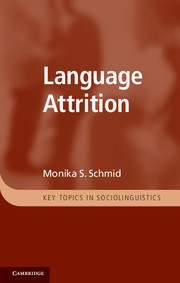Book contents
- Frontmatter
- Contents
- List of figures
- List of tables
- Preface
- Abbreviations
- 1 Introduction
- Part I Linguistic aspects of language attrition
- 2 What is attrition?
- 3 Cross-linguistic influence and the mental lexicon
- 4 Attrition in the mental lexicon
- 5 Attrition and the structure of language
- Part II Extralinguistic aspects of language attrition
- Part III Conducting research on language attrition – preliminary considerations
- Part IV Experimental designs for attrition research – the language attrition test battery
- Part V Coding and analysing the data
- 18 Conclusion
- Glossary
- Notes
- References
- Index
4 - Attrition in the mental lexicon
Published online by Cambridge University Press: 05 June 2012
- Frontmatter
- Contents
- List of figures
- List of tables
- Preface
- Abbreviations
- 1 Introduction
- Part I Linguistic aspects of language attrition
- 2 What is attrition?
- 3 Cross-linguistic influence and the mental lexicon
- 4 Attrition in the mental lexicon
- 5 Attrition and the structure of language
- Part II Extralinguistic aspects of language attrition
- Part III Conducting research on language attrition – preliminary considerations
- Part IV Experimental designs for attrition research – the language attrition test battery
- Part V Coding and analysing the data
- 18 Conclusion
- Glossary
- Notes
- References
- Index
Summary
What are the different processes of change due to cross-linguistic influence and to attrition? How do the latter manifest themselves in the mental lexicon? This chapter will demonstrate how a wholesale reduction of lexical diversity can be detected in the speech of attriters.
All of the processes described in the previous section have one thing in common: while the L1 lexical system may be changed or restructured to some extent due to L2 influence on L1, this change does not actually imply a reduction of vocabulary for the speaker. In Figs. 3.1–3.4, this is captured by the fact that the circle representing the L1 does not become smaller (in one case – borrowing (Figure 3.1) – it actually grows, symbolizing semantic enrichment as new elements are integrated into the system, enlarging the vocabulary and making it more precise).
However, the mental lexicon of an attriter can also be affected by a process that is not so much due to L2 and L1 interacting, but to L1 items becoming inaccessible: a speaker may forget certain words, or experience difficulties in retrieving them from memory. The crucial difference between this process and the ones illustrated above is that we assume that the latter are all externally induced, that is, caused in some way by interference from the L2. Bilinguals have to store and manipulate a great deal of information that is very similar, e.g. words that mean (nearly) the same or sound (nearly) the same in both their language systems.
- Type
- Chapter
- Information
- Language Attrition , pp. 38 - 46Publisher: Cambridge University PressPrint publication year: 2011



